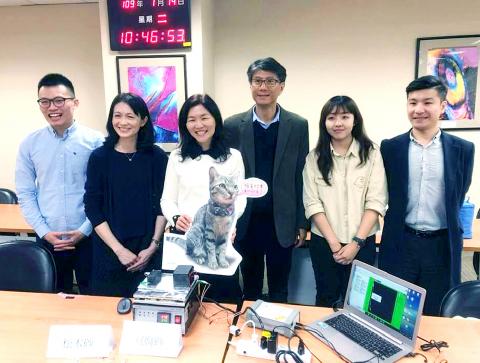A team of researchers at National Chiao Tung University (NCTU) yesterday unveiled a photo-electrical device for quickly testing urea concentration in cats, which can help detect kidney disease in felines at an early stage.
NCTU department of photonics professor Zan Hsiao-wen (冉曉雯) said that she has two cats, aged nine and 18, and that the younger one has kidney disease.
The hassle of visiting a veterinarian motivated her to design the quick-test device, she told a news conference at the Ministry of Science and Technology in Taipei.

Photo: CNA
Kidney disease is the most common chronic disease in cats older than 10, and is usually diagnosed via blood or urine tests, which cost at least NT$600 per test, in addition to other costs, said Kaohsiung-based Jong-Shing Animal Hospital vice president Huang Ming-ju (黃明如), who offered clinical advice to the team.
To detect kidney problems in cats, the team developed a device called “Dual Optical Fiber Reaction Tank” to test urine collected from a cat’s litter, as it is easier to collect than a separate urine sample, Zan said.
The detection process involves separating the urine from the litter in a reaction tank and using an acid-based solution to test the samples, Zan added.
The urine-containing solution influences optical and electrical currents that can be detected by a sensor attached to the device, she added.
The color of the solution deepens as the urea concentration increases, reducing the light that reaches the light sensor and weakening electrical currents, she said.
Cats with urea concentrations of lower than 400 millimoles might have kidney problems, as the kidneys cannot efficiently discharge urea, Zan said, adding that the device can produce test results in five minutes.
By comparison, a blood test for kidney disease can take up to an hour and kidney disease can only be confirmed after up to three months of clinical observation, Huang said.
The team used the device to test urine samples from 10 cats provided by the animal hospital, Zan said, adding that it only provides quick testing and is not intended to replace precise diagnoses by veterinarians.
As the team has only experimented with cat’s litter made of beans and wood materials, more research is needed for other materials, she added.
While other instruments for blood and urine testing can cost hundreds of thousands of New Taiwan dollars, the team’s device would only cost several thousand NT dollars, Zan said, urging businesses interested in the device to help commercialize it.
The team hopes to develop a smaller portable device with the same functionality by working with long-term collaborator Olivier Soppera of the French National Centre for Scientific Research, she said.

An essay competition jointly organized by a local writing society and a publisher affiliated with the Chinese Communist Party (CCP) might have contravened the Act Governing Relations Between the People of the Taiwan Area and the Mainland Area (臺灣地區與大陸地區人民關係條例), the Mainland Affairs Council (MAC) said on Thursday. “In this case, the partner organization is clearly an agency under the CCP’s Fujian Provincial Committee,” MAC Deputy Minister and spokesperson Liang Wen-chieh (梁文傑) said at a news briefing in Taipei. “It also involves bringing Taiwanese students to China with all-expenses-paid arrangements to attend award ceremonies and camps,” Liang said. Those two “characteristics” are typically sufficient

A magnitude 5.9 earthquake that struck about 33km off the coast of Hualien City was the "main shock" in a series of quakes in the area, with aftershocks expected over the next three days, the Central Weather Administration (CWA) said yesterday. Prior to the magnitude 5.9 quake shaking most of Taiwan at 6:53pm yesterday, six other earthquakes stronger than a magnitude of 4, starting with a magnitude 5.5 quake at 6:09pm, occurred in the area. CWA Seismological Center Director Wu Chien-fu (吳健富) confirmed that the quakes were all part of the same series and that the magnitude 5.5 temblor was

The brilliant blue waters, thick foliage and bucolic atmosphere on this seemingly idyllic archipelago deep in the Pacific Ocean belie the key role it now plays in a titanic geopolitical struggle. Palau is again on the front line as China, and the US and its allies prepare their forces in an intensifying contest for control over the Asia-Pacific region. The democratic nation of just 17,000 people hosts US-controlled airstrips and soon-to-be-completed radar installations that the US military describes as “critical” to monitoring vast swathes of water and airspace. It is also a key piece of the second island chain, a string of

The Central Weather Administration has issued a heat alert for southeastern Taiwan, warning of temperatures as high as 36°C today, while alerting some coastal areas of strong winds later in the day. Kaohsiung’s Neimen District (內門) and Pingtung County’s Neipu Township (內埔) are under an orange heat alert, which warns of temperatures as high as 36°C for three consecutive days, the CWA said, citing southwest winds. The heat would also extend to Tainan’s Nansi (楠西) and Yujing (玉井) districts, as well as Pingtung’s Gaoshu (高樹), Yanpu (鹽埔) and Majia (瑪家) townships, it said, forecasting highs of up to 36°C in those areas